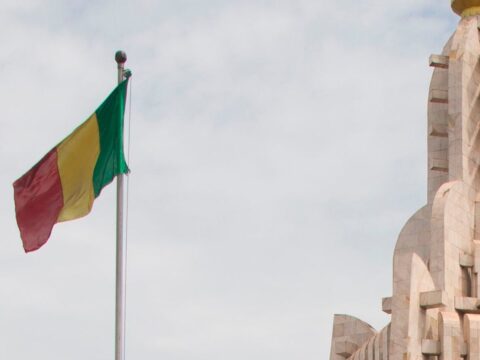Join Fox News for access to this content Plus get unlimited access to thousands of articles, videos and more with your free account! Please enter a valid email address. By entering your email, you are agreeing to Fox News Terms of Service and Privacy Policy, which includes our Notice of Financial Incentive. To access the content, check your email and follow the instructions provided.
Military and defense officials from the U.S. and Iraq are expected to continue talks on the future of U.S. military presence in Iraq in the coming weeks, a U.S. official tells Fox News. The Defense Department is expected to announce the resumed talks later this week, the official said. The U.S. currently has about 2,500 troops in Iraq for the Defeat ISIS mission. These troops are stationed at several bases throughout the country and have come under more than 60 attacks from Iranian proxy groups in Iraq since October 17. The U.S. has carried out several strikes targeting these Iranian-proxy groups, including airstrikes on Tuesday, targeting two Kataib Hezbollah headquarters buildings and an intelligence facility, according to a U.S. defense official. US CONDUCTS STRIKES ON IRAQ FACILITIES USED BY IRAN-BACKED MILITIA GROUP, DEFENSE SECRETARY AUSTIN SAYS Iraqi security forces arrive at the site where Al-Nujaba senior commander Abu Taqwa Al-Saidi was killed in a US drone strike in Baghdad, Iraq on January 04, 2024. (Murtadha Al-Sudani/Anadolu via Getty Images)The strikes have put pressure on the government of Iraq to question the U.S. presence in the region. On January 4th, the U.S. killed a militia leader in Baghdad who helped carry out several of these attacks on U.S. forces. According to U.S. Central Command, the U.S. drone strike on January 4th targeted and killed Mushtaq Jawad Kazim al Jawari. He was a leader of Iranian-proxy group Harakat al Nujaba and was involved in planning and carrying out attacks against U.S. service members in Iraq.This specific strike is in part what led the Iraqi Prime Minister, Mohammed Shia’ Al-Sudani to call for the U.S. to withdraw its troops from the country just a day later on January 5th. U.S. Army soldiers train at al-Asad air base. The base is located in Western Iraq. (Source: U.S. Army )”We are in the process of setting a date to begin a dialogue through a tripartite committee that was formed to determine arrangements to end this presence. This is a commitment which the government will not back down from and will not neglect any matter that completes national sovereignty over land, sky, and waters of our dear Iraq,” Al-Sudani said. Pentagon Press Secretary Maj. Gen. Pat Ryder told reporters in a Defense Department briefing on January 4th shortly after the militia leader was killed by the U.S. strike, “Our focus is going to continue to remain on the defeat ISIS mission. But again, we’re not going to hesitate to protect our forces if they’re threatened.”IRAQI PRIME MINISTER DEFENDS US TROOP PRESENCE, SAYS IT’S NECESSARY FOR FIGHTING ISISThe Pentagon has not received any requests to end its presence in the region, despite the words from the Iraqi prime minister, multiple defense officials tell Fox News. Pentagon spokesman Air Force Brig. Gen. Patrick Ryder during a briefing at the Pentagon in Washington, on Tuesday, Jan. 9. (AP/Susan Walsh)When asked if the U.S. has been asked to withdraw its troops from Iraq, Ryder told reporters, “I’m not aware of any plans. We continue to remain very focused on the Defeat ISIS mission under CJTF-OIR, as we advise and assist the Iraqis. And as you’ve heard us say many times before, we’re there at the invitation of the government of Iraq.”The upcoming talks between the U.S. and Iraq were planned in August, well before Hamas invaded Israel and the attacks on U.S. forces in Iraq began. The talks could have a different outcome than what would have been expected back in August.CLICK HERE FOR THE FOX NEWS APP Iraqi Air Force helicopters land at Ain al-Asad airbase in Anbar province, Iraq. (REUTERS/Thaier Al-Sudani)In August 2023, before the conflict in the Middle East started, the U.S. and Iraq agreed to start a “Higher Military Commission” or HMC for talks. According to a Defense Department press release from that time, “The United States and the Republic of Iraq intend to consult on a future process, separate from the JSCD and inclusive of the Coalition, to determine how the Coalition’s military mission will evolve on a timeline according to the following factors: the threat from ISIS, operational and environmental requirements, and ISF capability levels.”The talks will be in the form of a working group with both defense and military officials from the Pentagon, the U.S. official said.Â
Breaking News
2024-10-27 A man who abused up to 3,500 girls online has been sentenced for crimes including manslaughter
2024-10-27 Rear Admiral Claims Government COVERED UP Alien Contact. We’ve Talked with ALIENS????
2024-10-27 BREAKING: UN Sec Council Passes Gaza Aid, US Sits Out; Trump Audio EXPOSES Pressure On MI Officials
2024-10-27 Missing Juvenile Aamina Turner from the 12th District – Blotter
2024-10-27 Missing Endangered Person Ivelisse Lugo from the 2nd District – Blotter
Static News
500k views later The FLORIDA...
phillynews215 2021-04-27 50 Comments on Body Cam: Officer Fatal Shooting Man with a Sword – Pomona Police March 30- 2020
#officerinvolvedshooting #policeshooting #Pomona Policedepartment Please...
phillynews215 2021-04-27 50 Comments on Bodycam Shows Deputies Shooting Armed Suspect in Greenville, South Carolina
** (Disclaimer: This video content...
Video brought to you by...
Rafael Nieves 2024-10-27 0 Comment on A man who abused up to 3,500 girls online has been sentenced for crimes including manslaughter
A "relentless and cruel" online...
Rafael Nieves 2024-10-27 38 Comments on Rear Admiral Claims Government COVERED UP Alien Contact. We’ve Talked with ALIENS????
Robby Soave and Briahna Joy...
Rafael Nieves 2024-10-27 0 Comment on BREAKING: UN Sec Council Passes Gaza Aid, US Sits Out; Trump Audio EXPOSES Pressure On MI Officials
The Hill’s Kevin Cirilli recaps...
Rafael Nieves 2024-10-27 0 Comment on Missing Juvenile Aamina Turner from the 12th District – Blotter
The Philadelphia Police Department is...
Rafael Nieves 2024-10-27 0 Comment on Missing Endangered Person Ivelisse Lugo from the 2nd District – Blotter
The Philadelphia Police Department is...
phillynews215 2023-11-12 Comments Off on Fired Amazon Worker Chris Smalls Responds To Leaked Smear Campaign Plans
Amazon executives described Smalls as...
phillynews215 2021-05-05 Comments Off on 32Pct. Ofc. Brabazon #10455 Uses Phone To Play Fantasy Football on Active Duty
Per the NYPD updated rule...
phillynews215 2021-07-12 45 Comments on Bodycam Shows Cop Shooting Suspect Who Was Charging at Him With a Machete
* (Disclaimer: This video content...
phillynews215 2021-05-01 28 Comments on Woman driving stolen vehicle claims to be Beyoncé Knowles!
Donkey Of The Day goes...
Singapore officials charge airline passenger after he allegedly stole over $23K from others on plane
phillynews215 2023-12-20 Comments Off on Singapore officials charge airline passenger after he allegedly stole over $23K from others on plane
Officials in Singapore charged a...
Proudly powered by ANGELHOUSE 2009 - 2024 | ALL YOUTUBE VIDEOS IS A REGISTERED TRADEMARK OF GOOGLE INC. | THE YOUTUBE CHANNELS AND BLOG FEEDS IS MANAGED BY THE RIGHTFUL OWNERS/CREATORS HOSTING BY PHILLYFINESTSERVERSTATS INC. ALL RIGHTS RESERVED




















